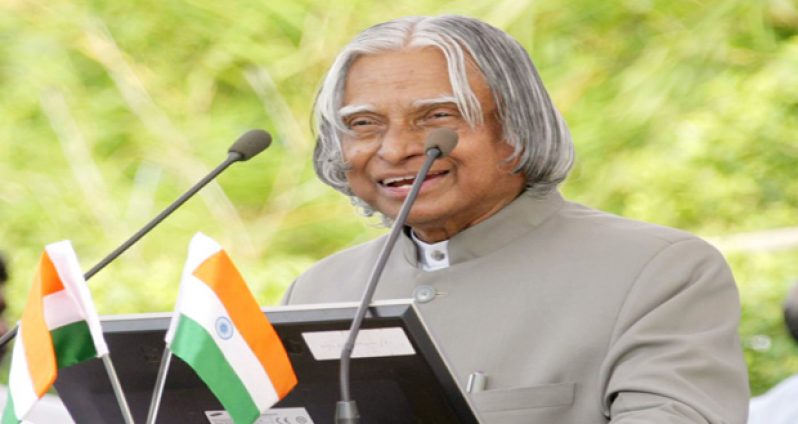FORMER Indian President, Dr. Abdul Kalam has died at a hospital after collapsing while delivering a lecture in north-eastern India.
Kalam passed away on Monday night, according to B Warjri, Chief Secretary of Meghalaya state. He was 83.
Local media said he had been delivering a lecture at the Indian Institute of Management in Shillong when he collapsed and suffered cardiac arrest. Al Jazeera reported that Dr. Kalam was rushed to the Bethany Hospital where he breathed his last breath.
The President of India from 2002 until 2007, Dr. Kalam was known as the father of the country’s military missile programme.
Tributes immediately started to pour in for Kalam, with politicians and celebrities praising him.
The Indian High Commission in Georgetown in a statement yesterday announced with sorrow the passing away of the former President.
Dr. Kalam was born in Rameswaram, Tamil Nadu on October 15, 1931 and raised there.
According to the release, he studied physics and aerospace engineering and was one of the most eminent scientists of the country. Dr Kalam took the lead for the conduct of lndia’s nuclear tests in 1998.
For his achievements, he was awarded the coveted lndian civilian awards — Padma Bhushan (1981), Padma Vibhushan (1990) and the highest civilian award Bharat Ratna (1997).
He led many pioneering programmes such as the Indian Space Research Organisation’s Satellite Launch programme and the country’s Guided Missile programme.
POPULAR WITH CHILDREN
Dr. Kalam was Scientific Adviser to the Prime Minister of India from July 1992 to July 1997. A bachelor, he was very popular with children and young people, the statement from the Indian High Commission said.
Dr. Kalam served as 11th President of lndia from July 2002 to July 2007 and was widely acclaimed as the “people’s President.”
As a mark of respect to the departed leader, a Book of Condolence will be opened at the premises of the High Commission of lndia on July 30 from 10:00-12:00 hrs and on July 31 from 14.00-16.00 hrs.
DEEPLY SADDENED
Meanwhile, the Indian Arrival Committee (IAC) said it is deeply saddened by the death of the 11th President of the biggest democracy of the world, India.
The IAC, in a statement said it has always recognised the selfless contribution that Dr. Kalam has made towards the development and sustainability of India in the fields of science, religion, education and culture.
“He was able to successfully influence the minds of scores of Indians who deeply admired and took note of his words of advice,” the IAC said.
Dr. Kalam served as Professor at Anna University in Chennai from November 2001 and was involved in teaching and research tasks.
“Above all, one must also acknowledge the mission he took up to ignite the young minds for national development by meeting high school students across the country and which has seemingly been successful over the years,” he statement said.
Apart from that, the IAC also recognises the immense contributions that Dr. Kalam has made towards India’s first indigenous Satellite Launch Vehicle (SLV-III), development of the Indigenous Guided Missiles at the Defence Research and development organisation, among others.
TREMENDOUS BLOW
The IAC believes that given the many challenges today, the loss of Dr. Kalam is a tremendous blow to the efforts to preserve and develop the Indian culture.
“With his death, India has lost an icon, a stalwart and a patriot,” the IAC stated.
As a well-rounded individual, Dr. Kalam has provided pertinent information to many which has aided in the understanding of life’s basic challenges.
In his literary pursuit, four of his books – ‘Wings of Fire’, ‘India 2020 – A Vision for the New Millennium’, ‘My journey’ and ‘Ignited Minds – Unleashing the power within India’ have become household names in India and among the Indian nationals abroad and which will remain over time as a reference for future generations.
“The IAC takes this opportunity to extend its sincere condolences to the relatives, friends and colleagues of Dr. Abdul Kalam in this time of sorrow. May his soul rest in eternal peace,” the statement concluded.



.jpg)










